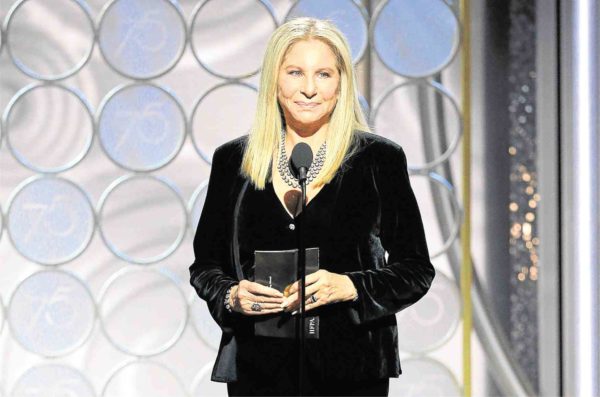
Barbra Streisand
From the get-go, the 2018 Golden Globe awards wore the TV-film industry’s collective heart on its sleeve— and it was colored black.
Black for cumulative mourning over past, unaddressed excesses; for firm, no-nonsense resolve to finally put a stop to the power-tripping and sexual exploitation that have claimed many victims for decades—and as a grim and “deadly” warning for predators to stop. Now.
The no-nonsense tone was set early on by the very first award, for best TV actress Nicole Kidman’s portrayal of a victim of domestic violence in the series, “Big Little Lies.”
To further underscore the pointed focus, reference and preference, the show itself won for best limited series, and its other players, Alexander Skarsgard and Laura Dern were similarly honored.
Other awardees and presentors also urged their industry colleagues to join the #MeToo and Time’s Up campaigns to “name and shame” powerful practitioners of exploitation into extinction—or irrelevance.
For her part, Barbra Streisand, who presented the best director award, expanded the discussion and move for industry reforms to include equal career opportunities and pay for women.
The first woman to have won a best film director award (for “YentI”), Streisand noted that her triumph happened way back in 1984—so, it was high time for other female directors to singularly succeed in the still “mostly male” world of filmmakers.
Tersely seconding the motion, Natalie Portman pointedly noted before giving the best director trophy to Guillermo del Toro for “The Shape of Water,” that this year’s nominees were all-male, as usual.
But, the moment that most searingly galvanized viewers into empathetic realization of the urgent need for shared action against predatory exploitation and other industry sins of commission and omission was Oprah Winfrey’s acceptance speech as this year’s Cecil B. DeMille honoree.
The first black woman to receive the lifetime achievement prize, Winfrey extolled the many women who have finally stepped out of the shadows to shame and name their powerful exploiters, even if they were risking their careers.
She also made it a point to include all victims of exploitation, in showbiz and elsewhere, for finally “protesting” and speaking the truth, which is the most powerful weapon we all have.
“The fight transcends any culture, geography, race, religion, politics or workplace. So, let’s express our gratitude to all women who have endured years of assault and abuse. A new day is on the horizon because of a lot of magnificent women and some pretty phenomenal men, fighting hard to make sure that nobody ever has to say ‘Me too!’ again!”
Gutsy and proactive women were also extolled by the choice of “Three Billboards Outside Ebbing, Missouri” as best film.
It dramatizes the struggle and resolve of a woman who forces lawmen to solve the murder of her daughter by printing three signs with a scathing message directed at the town’s police chief.
Frances McDormand also copped the best actress award for her galvanizing portrayal of the film’s relentless protagonist—a sign of even more proactive things to come in reel and real Hollywood.